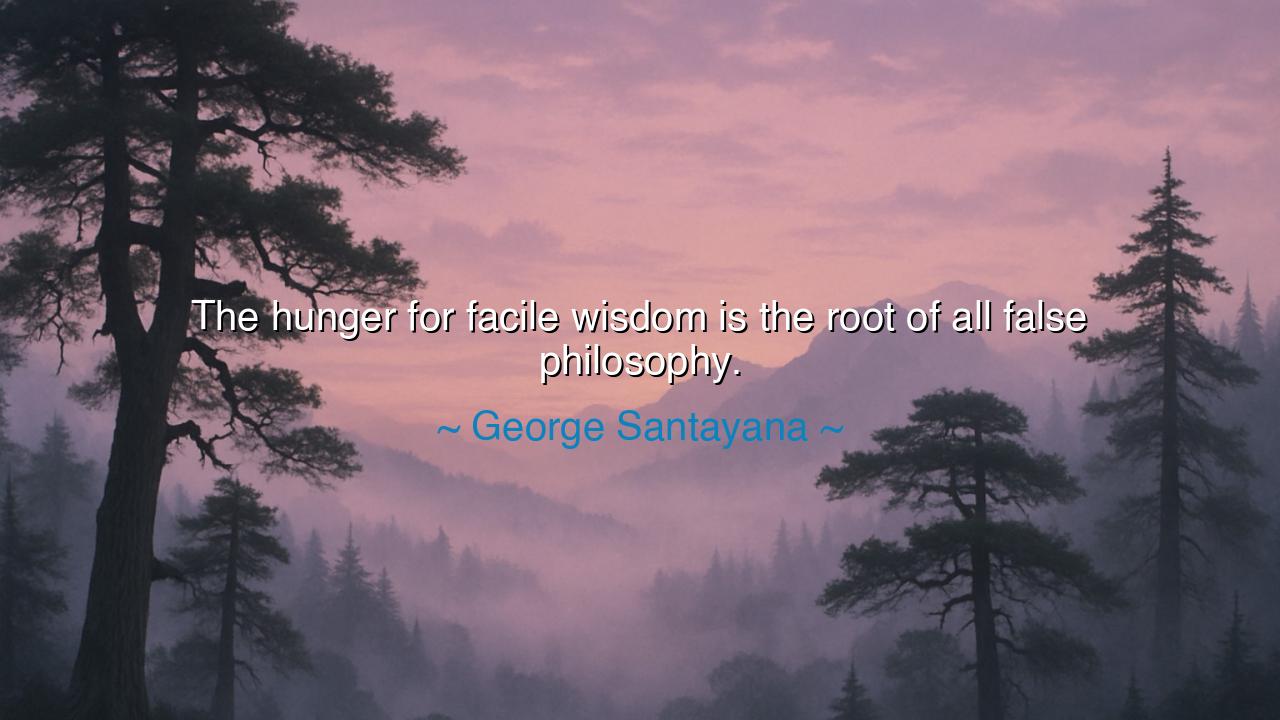
The hunger for facile wisdom is the root of all false






George Santayana, with the clarity of a seer, declares: “The hunger for facile wisdom is the root of all false philosophy.” In these words he warns against the seduction of easy answers, the shallow truths that men embrace because they comfort rather than challenge. Facile wisdom is not wisdom at all, but a glittering counterfeit, promising quick satisfaction while leaving the soul starved. True wisdom demands struggle, patience, and humility; false philosophy arises when men would rather possess certainty than endure the labor of seeking truth.
The meaning strikes deep. Santayana reminds us that the human heart yearns for understanding, but this yearning becomes dangerous when it demands simplicity at the cost of truth. Many prefer doctrines that flatter, that soothe, that give them the illusion of knowing without the discipline of thought. But such doctrines, born of impatience, breed false philosophy—systems built not on reality, but on the cravings of the mind.
History provides a stern witness. Consider the rise of alchemy in the Middle Ages. Many sought the philosopher’s stone, an easy secret that would transmute base metal into gold. Instead of slow study of nature’s laws, they clung to symbols and riddles, chasing wealth through illusions. Yet it was those who abandoned this hunger for quick answers—figures like Isaac Newton, who endured years of study, experiment, and error—who uncovered the true laws of physics. The alchemists pursued facile wisdom and were lost in shadows; Newton pursued patient truth and illuminated the world.
This lesson echoes in every age. In politics, in science, in religion, false teachers arise offering shortcuts to understanding, claiming certainty where none can yet be found. Their words spread quickly, for men are eager to be comforted. Yet, when tested, these easy answers crumble, leaving only disillusion. The path of true philosophy, by contrast, is narrow and hard, demanding that we admit our ignorance, wrestle with doubt, and persevere in the slow ascent toward wisdom.
Therefore, let the seeker be vigilant. Do not hunger for what is easy, but for what is true. Turn away from the glitter of facile wisdom, and embrace the rugged path of honest inquiry. For though it is long and steep, its summit is firm, and its reward is freedom. The counterfeit offers comfort but enslaves; the truth demands labor but sets the soul alight. Santayana’s counsel is clear: only those who endure the difficulty of wisdom may escape the snare of false philosophy.






BHBao han
This idea makes me reflect on the difference between knowledge and understanding. It’s easy to memorize principles or repeat impressive phrases, but genuine wisdom requires contemplation and humility. I think Santayana was cautioning against the illusion of enlightenment — when people think they’ve ‘figured it out’ too quickly. Do you believe true wisdom can ever be simple, or must it always be complex?
MTMoon Trang
I find this quote both philosophical and psychological. It suggests that our desire for simple wisdom says more about human weakness than about flawed ideas themselves. Perhaps false philosophy begins in impatience — the refusal to wrestle with ambiguity. But is it realistic to expect everyone to think deeply in a fast-paced world that glorifies instant answers and quick takes?
CCchanh cuti=))
There’s something timeless about this observation. Every era seems to have its own version of ‘facile wisdom,’ whether it’s slogans, ideologies, or self-help clichés. Do you think humans are naturally drawn to simplicity because uncertainty feels threatening? Maybe false philosophies thrive not because they’re convincing, but because they comfort us when reality feels too complex to grasp.
Ttithiphop
This reflection feels like a warning against intellectual laziness. It’s uncomfortable to admit how often people, myself included, settle for ideas that sound profound but lack substance. I wonder if education should focus more on teaching people how to question beautifully packaged ‘truths.’ Is critical thinking the antidote to this hunger for easy wisdom that Santayana describes?
GDGold D.dragon
I really appreciate how Santayana challenges the human tendency to seek easy truths. It makes me wonder — is false philosophy inevitable in a world that rewards confidence more than accuracy? Sometimes, people prefer ideas that feel comforting rather than those that require thought or doubt. How can we encourage deeper thinking when simplicity is so seductive?